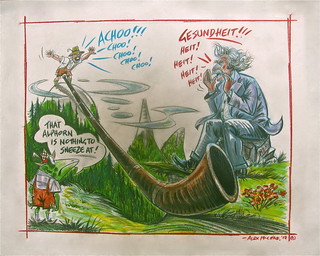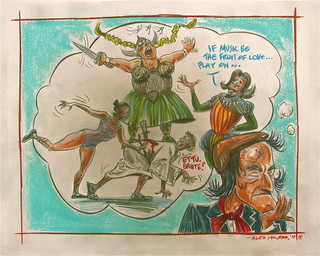|
Home
|
AWADmail Issue 778A Weekly Compendium of Feedback on the Words in A.Word.A.Day and Tidbits about Words and LanguageSponsor’s Message: Does the dad in your life dislike just about everything? Well, we’ve got new for you -- he’ll love our “I Hate Fake” Collection. He won’t admit it, of course. Nope -- so we’d like to invite this week’s Email of the Week winner, Dave Hatfield (see below), as well as all AWADers to Shop For Pop Now and save 10% with coupon ‘dadsrule’.
From: Anu Garg (words at wordsmith.org)
Half of World’s Languages Could Be Extinct by 2100
Trump Wasn’t Always so Linguistically Challenged. What Could Explain the Change?
From: Amy Bruno-Lindner (amy.bruno-lindner univie.ac.at) I have lived in Vienna, Austria, for 35 years and am fluent in German. The word gemütlich appears without fail in all tourist guides about Vienna in an attempt to convey the essence of what the Viennese value in life. I had always known the word and used the adjective form to describe a cosy corner in a café or the soft pillow my cat had chosen to lie on. But it wasn’t until one day a few years ago that I truly understood the essence of the word for the Viennese: At the end of an evening with close friends, after we had enjoyed good food and wine and conversation that flowed effortlessly, with one funny story leading to another, I said goodbye to my friends with the words that just popped out of my mouth: “Es war sehr gemütlich mit euch!” (“It was very gemütlich with you!”) I knew then that I had finally understood the word.
Mag. Amy Bruno-Lindner, Senior Lecturer, University of Vienna, Department
of English and American Studies, Vienna, Austria
From: Dave Hatfield (ddhatfi verizon.net) Subject: gemutlich Gemuetlichkeit was also a very kind and memorable word in a famous German toast in most Oktoberfest tents:
“Ein Prosit” “Ein Prosit, ein Prosit Der Gemütlichkeit Ein Prosit, ein Prosit Der Gemütlichkeit. OANS! ZWOA! DREI! G’SUFFA!” (meaning & recording) Upon which everyone toasts everyone else at their large table and takes a drink from the normally large liter mugs of bier, although it’s quite proper now for many to drink wine at the tables today. While it really doesn’t translate directly into English, it’s meant to convey a sense of community and coziness with your fellow tablemates, most of whom you’ve never met, and those around you. We actually made many friends at every fest we went to and always carried calling cards with us and paper to collect names, numbers, and email addresses. We had many dinners with new friends made at fests.
Dave Hatfield, Severn, Maryland
From: Kathryn Buck (blsspks aol.com) gemütlich, Götterdämmerung Please. Bitte.
Kathryn Buck, New York, New York
Well, when a word travels over to another language, often it loses its
appendages in the journey. In English, these words are mostly used without
accent marks. Similarly, German spells nouns with an uppercase initial and
we follow that convention for a while when the word is new. Once a word has
been acclimatized it loses the uppercase.
That said, there was a typo in the etymology of the word gemutlich: The German spelling should have been listed as gemütlich, not gemüetlich. Interestingly, the former spelling of the word did include both ü and e: gemüetlîch.
Also, many readers wrote about the earliest documented use of the
word. Please note that we list the earliest document date of the word’s
use in English.
From: Linda Owens (lindafowens netzero.net) My favorite German word, thanks. Also, Twain once said he’d rather decline two drinks than one German adjective. When living in Frankfurt am Main between 1967 and 1969, when my husband was in the US Army, I learned to mumble the endings. Now I wish I’d learned them. But I was busy with two babies and one on the way.
Linda Owens, Exeter, Rhode Island
From: Frances Witt (fwitt shaw.ca) Another lovely way to express the very trendy Danish and Norwegian word hygge. Easy to find a million google hits on this now popular word, but too new for my autospell to recognize it.
Frances Witt, Victoria, Canada
From: Eleanor Holwerda (eholwerda shaw.ca) The Dutch have a similar word, gezellig.
Eleanor Holwerda, Victoria, Canada
From: Ellie Weld (ellieweld gn.apc.org) In my twenties I was an editorial assistant at the Yale University Press. In warm weather we would take our sandwiches and several bottles of Liebfraumilch to the nearest patch of grass for a jolly lunch. We called ourselves the Liebfraumilchgesellschaft; so for me the word evokes youth, sunshine, and German white wine.
Ellie Weld, London, UK
From: Michael Lutzeier (ganzleichtzumerken yahoo.com) In Germany every “Gesellschaft” calls itself publicly “Gemeinschaft” from the get-go, as to disguise the impersonal obligations towards the society as personal ones, and thus make their members more biddable and obedient. For example, the European Community is called Europäische Gemeinschaft, formerly Europäische Wirtschaftsgemeinschaft. So it’s clearly based on economics. Shouldn’t it then be called Gesellschaft?
Michael Lutzeier, Dießen, Germany
From: Hannah Kruse (c-kruse t-online.de) The term “Gesamtkunstwerk” has got an additional meaning in German in the last years. If someone looks visibly different, breaking rules of “common fashion”, they may be referred to as “Gesamtkunstwerk” behind their back -- and it usually is not meant in a flattering way. This is rather sad as such “paradise birds” and other “misfits” enrich our society and should not be scolded, not even in veiled terms.
Hannah Kruse, Gera, Germany
From: Ken Behrmann (behrmann jccc.edu) Krummholz is familiar to mountain hikers and is a fairly common term in descriptions of trails that pass above the treeline, e.g “The trail turns right on steep switchbacks ... Tall spruce give way to krummholz, willow, forbs, and sedges ...” (source)
Ken Behrmann, Lenexa, Kansas
From: Richard W. Burris (r_w_burris comcast.net) Early music enthusiasts certainly know the German word for “bent” because a renaissance instrument, the Krummhorn (often Anglicized to Crumhorn) has been revived and is played today. The “bent horn” is a capped reed instrument. In other words, the double reed is inside a cap and the lips do not touch the reeds, which makes exact intonation very difficult. The sound has a buzzing component to it and they are often referred to as “buzzies” in the English-speaking world. (video, 1 min.)
Richard W. Burris, Alexandria, Virginia
From: Carolyn C Martin (carokei msn.com) I will always be grateful for having taken German. It so clarified the distinction between the direct and indirect object as well as how important word order in a sentence is in English. On the other hand, that a pencil is masculine (der bleistift), a pen feminine (die feder), and a piece of paper neutral (das papier) has not made much of a difference in my life.
Carolyn C Martin, Litchfield, Connecticut
From: Alex McCrae (ajmccrae277 gmail.com) Inspired by the somewhat hyperbolic, yet droll cited Mark Twain quotation regarding the extreme length of many German words (“Those things are not words, they are alphabetical processions.”), I came up with this Bavarian alpine scenario, where the sneezing alphorn player’s resounding “ACHOO!” and Twain’s polite “Gesundheit!” reply continue to echo through the rarefied air. Perhaps adding credence to Twain’s earlier quoted lexicographic observation. Ha! Reflecting on Anu’s “NOTES” and Ms. Marjana Gaponenko’s cited USAGE quotation for the word “Gesamtkunstwerk”, I’ve envisioned Herr Richard Wagner conjuring up a kind of crazed mishmash of performing arts; his trying to intellectually synthesize his thoughts for future writings regarding the commonality within all these seemingly disparate artistic disciplines.
Alex McCrae, Van Nuys, California
From: Anu Garg (words at wordsmith.org) The text in each box is an anagram of the text in other boxes.
From: Anu Garg (words at wordsmith.org)
The garden was truly gemutlich
Doesn’t Speaker Ryan look cute lick-
It’s gemutlich to sit by a fire,
Said Trump, “Mike, you look so cherubic,
The psychiatrist could not hold his tongue
A complacent and calm anschauung
Now Trump has two ways that he staffed,
At the office today my whole team laughed
With performances held in the gorse,
At the movies I love a gesamtkunstwerk
They climbed heights on a mountain trail,
Now abroad is our President Krummholz. -Steve Benko, New York, New York (stevebenko1 gmail.com)
From: Phil Graham (pgraham1946 cox.net) By losing in the practice trial, the law student suffered gemutlich. Up anschauung I feel (and smell) better. To avoid being caught by cheetahs, gesellschaft to run fast. When the kaucho mounts, his Kuatemalan krummholz the reins.
Phil Graham, Tulsa, Oklahoma
From: Deet Lewis (deetlew60 gmail.com) I have learned SO much over the years I’ve received Word.A.Day and have told many people about it. I’m an English-speaker living in a Spanish-speaking country (for 24 years) and am glad to be reminded how rich my native language is. And because my parents were European, I enjoy when you explain foreign words that English has absorbed. THANK YOU & GRACIAS.
Deet Lewis, Antigua, Guatemala
A THOUGHT FOR TODAY:
The moral test of government is how that government treats those who are in
the dawn of life, the children; those who are in the twilight of life, the
elderly; and those who are in the shadows of life -- the sick, the needy
and the handicapped. -Hubert Horatio Humphrey, US Vice President (1911-1978)
|
|
Awards | Stats | Links | Privacy Policy
Contribute | Advertise
© 1994-2026 Wordsmith

